Honda Jazz vs VW Tiguan – Which car suits you better?
Both models have their strengths – but which one suits you more?
Compare performance, efficiency, price and space directly: Honda Jazz or VW Tiguan?
Costs and Efficiency:
When it comes to price and running costs, the biggest differences usually appear. This is often where you see which car fits your budget better in the long run.
Honda Jazz has a significantly advantage in terms of price – it starts at 23100 £, while the VW Tiguan costs 32800 £. That’s a price difference of around 9685 £.
Fuel consumption also shows a difference: VW Tiguan manages with 0.40 L and is therefore decisively more efficient than the Honda Jazz with 4.50 L. The difference is about 4.10 L per 100 km.
Engine and Performance:
Power, torque and acceleration are the classic benchmarks for car enthusiasts – and here, some clear differences start to show.
When it comes to engine power, the VW Tiguan has a convincingly edge – offering 272 HP compared to 122 HP. That’s roughly 150 HP more horsepower.
In acceleration from 0 to 100 km/h, the VW Tiguan is decisively quicker – completing the sprint in 5.90 s, while the Honda Jazz takes 9.40 s. That’s about 3.50 s faster.
In terms of top speed, the VW Tiguan performs clearly perceptible better – reaching 242 km/h, while the Honda Jazz tops out at 175 km/h. The difference is around 67 km/h.
There’s also a difference in torque: VW Tiguan pulls clearly perceptible stronger with 400 Nm compared to 253 Nm. That’s about 147 Nm difference.
Space and Everyday Use:
Whether family car or daily driver – which one offers more room, flexibility and comfort?
Both vehicles offer seating for 5 people.
In curb weight, Honda Jazz is clearly perceptible lighter – 1302 kg compared to 1599 kg. The difference is around 297 kg.
In terms of boot space, the VW Tiguan offers convincingly more room – 652 L compared to 304 L. That’s a difference of about 348 L.
In maximum load capacity, the VW Tiguan performs clearly perceptible better – up to 1650 L, which is about 445 L more than the Honda Jazz.
When it comes to payload, VW Tiguan noticeable takes the win – 533 kg compared to 388 kg. That’s a difference of about 145 kg.
Who comes out on top?
Overall, the VW Tiguan shows itself to be outperforms in nearly all aspects and secures the title of DriveDuel Champion.
It convinces with the more balanced overall package and proves to be the more versatile choice for everyday use.

VW Tiguan
Honda Jazz
The Honda Jazz stands out in the compact car category with its intelligently designed interior, offering a surprisingly spacious cabin that comfortably accommodates passengers and luggage. Its efficient hybrid powertrain ensures a smooth and economical driving experience, ideal for both urban commutes and longer journeys. Furthermore, the Jazz is equipped with a range of advanced safety features, providing peace of mind while on the road.
details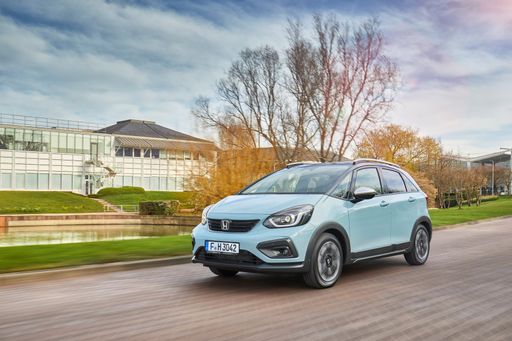 @ hondanews.eu
@ hondanews.eu
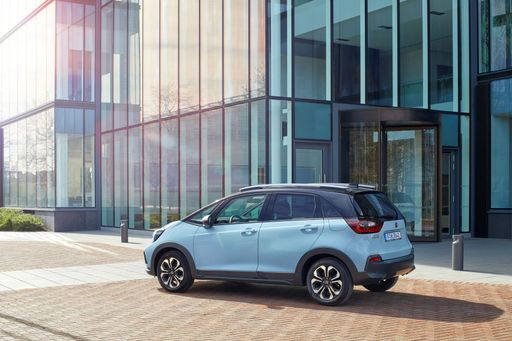 @ hondanews.eu
@ hondanews.eu
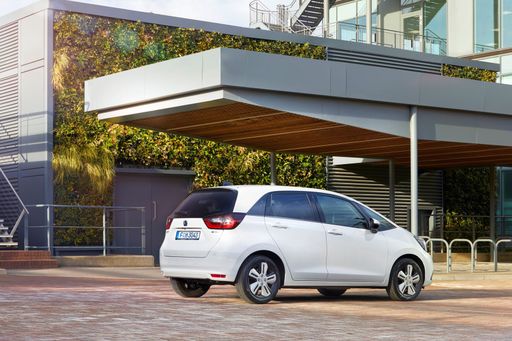 @ hondanews.eu
@ hondanews.eu
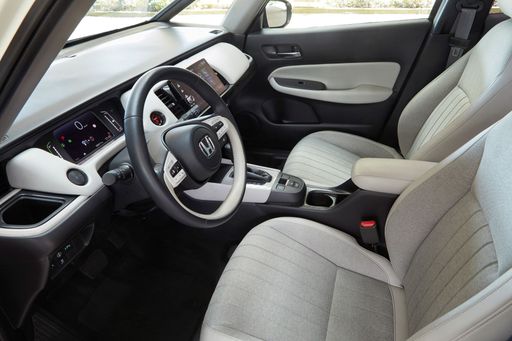 @ hondanews.eu
@ hondanews.eu
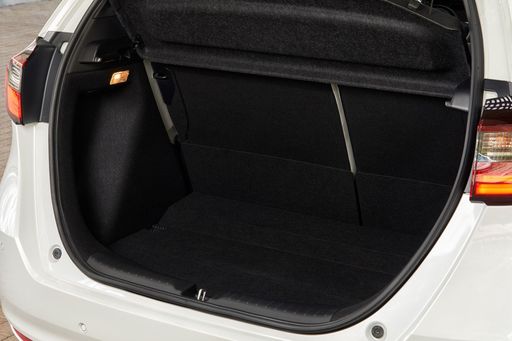 @ hondanews.eu
@ hondanews.eu
VW Tiguan
The VW Tiguan presents itself as a versatile and practical option in the SUV market, combining a stylish design with a spacious and comfortable interior. It offers a smooth driving experience, making it well-suited for both urban environments and longer journeys. With its focus on safety and innovative technology features, the Tiguan remains a compelling choice for families and adventurers alike.
details @ Volkswagen
@ Volkswagen
 @ Volkswagen
@ Volkswagen
 @ Volkswagen
@ Volkswagen
 @ Volkswagen
@ Volkswagen
 @ Volkswagen
@ Volkswagen
 @ Volkswagen
@ Volkswagen

|

|
|
|
|
Costs and Consumption |
|
|---|---|
|
Price
23100 - 26700 £
|
Price
32800 - 51900 £
|
|
Consumption L/100km
4.5 - 4.8 L
|
Consumption L/100km
0.4 - 8.4 L
|
|
Consumption kWh/100km
-
|
Consumption kWh/100km
-
|
|
Electric Range
-
|
Electric Range
119 - 129 km
|
|
Battery Capacity
-
|
Battery Capacity
19.70 kWh
|
|
co2
102 - 108 g/km
|
co2
8 - 190 g/km
|
|
Fuel tank capacity
40 L
|
Fuel tank capacity
45 - 58 L
|
Dimensions and Body |
|
|---|---|
|
Body Type
Hatchback
|
Body Type
SUV
|
|
Seats
5
|
Seats
5
|
|
Doors
5
|
Doors
5
|
|
Curb weight
1302 - 1320 kg
|
Curb weight
1599 - 1890 kg
|
|
Trunk capacity
304 L
|
Trunk capacity
490 - 652 L
|
|
Length
4089 - 4105 mm
|
Length
4539 mm
|
|
Width
-
|
Width
1842 - 1859 mm
|
|
Height
1526 - 1556 mm
|
Height
1656 - 1658 mm
|
|
Max trunk capacity
1205 L
|
Max trunk capacity
1486 - 1650 L
|
|
Payload
370 - 388 kg
|
Payload
460 - 533 kg
|
Engine and Performance |
|
|---|---|
|
Engine Type
Full Hybrid
|
Engine Type
Plugin Hybrid, Petrol, Petrol MHEV, Diesel
|
|
Transmission
Automatic
|
Transmission
Automatic
|
|
Transmission Detail
CVT
|
Transmission Detail
Dual-Clutch Automatic
|
|
Drive Type
Front-Wheel Drive
|
Drive Type
Front-Wheel Drive, All-Wheel Drive
|
|
Power HP
122 HP
|
Power HP
130 - 272 HP
|
|
Acceleration 0-100km/h
9.4 - 9.7 s
|
Acceleration 0-100km/h
5.9 - 10.6 s
|
|
Max Speed
175 km/h
|
Max Speed
198 - 242 km/h
|
|
Torque
253 Nm
|
Torque
220 - 400 Nm
|
|
Number of Cylinders
4
|
Number of Cylinders
4
|
|
Power kW
90 kW
|
Power kW
96 - 200 kW
|
|
Engine capacity
1498 cm3
|
Engine capacity
1498 - 1984 cm3
|
General |
|
|---|---|
|
Model Year
2023
|
Model Year
2024 - 2025
|
|
CO2 Efficiency Class
C
|
CO2 Efficiency Class
B, G, D, E, F
|
|
Brand
Honda
|
Brand
VW
|
Is the Honda Jazz offered with different drivetrains?
The Honda Jazz is offered with Front-Wheel Drive.
The prices and data displayed are estimates based on German list prices and may vary by country. This information is not legally binding.
